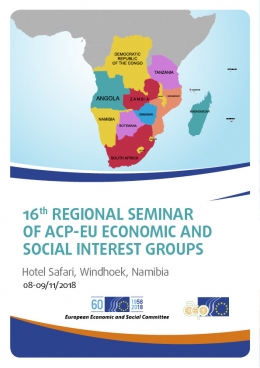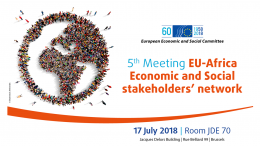European Economic
and Social Committee
AKT a Afrika
Od prvého dohovoru z Lomé (1975) po dohodu z Cotonou (2000 – 2021) vzťahy medzi EÚ a skupinou 79 afrických, karibských a tichomorských štátov (krajiny AKT), ktoré sa nedávno stali Organizáciou afrických, karibských a tichomorských štátov (OAKTŠ), upravovalo partnerstvo EÚ – AKT.
Počas tohto obdobia sa EHSV spolu s občianskou spoločnosťou krajín AKT zasadzoval za uznanie kľúčovej úlohy, ktorú v rozvoji zohrávajú neštátne subjekty, až kým sa to nedosiahlo v dohode z Cotonou, ktorou bol EHSV poverený organizovaním rôznych aktivít a konzultácií s „hospodárskymi a sociálnymi záujmovými skupinami krajín AKT a EÚ“ s cieľom zhromažďovať názory organizovanej občianskej spoločnosti a umožniť jej vyjadriť sa. Cieľom bolo podporovať výmeny a poskytovať odporúčania k otázkam a politikám týkajúcim sa vzťahov krajín AKT a EÚ, ktoré boli neskôr oficiálne adresované vedúcim predstaviteľom EÚ a krajín AKT.
Z praktického hľadiska činnosti EHSV týkajúce sa vzťahov medzi EÚ a OAKTŠ prebiehajú najmä pod vedením inkluzívneho monitorovacieho výboru AKT – EÚ zloženého z členov EHSV a delegátov zastupujúcich hospodárske a sociálne záujmové skupiny z krajín AKT.
Monitorovací výbor AKT – EÚ udržiava pravidelné kontakty so zástupcami občianskej spoločnosti v krajinách AKT na rôznych úrovniach prostredníctvom:
- pravidelných zasadnutí monitorovacieho výboru EÚ – AKT,
- regionálnych seminárov v krajinách AKT, čím poskytuje fórum na diskusiu o témach spoločného záujmu so zástupcami občianskej spoločnosti vždy v inom regióne,
- trojročných valných zasadnutí hospodárskych a sociálnych záujmových skupín krajín AKT a EÚ v Bruseli.
EHSV udržiava aj pravidelné kontakty so zástupcami hospodárskych a sociálnych záujmových skupín Africkej únie v rámci spoločnej stratégie EÚ a Afriky. EHSV organizuje najmä výročné stretnutia so sieťou hospodárskych a sociálnych zainteresovaných strán Afriky a EÚ.
EHSV už mnoho rokov udržiava pravidelné kontakty so Spoločným parlamentným zhromaždením AKT – EÚ tým, že predkladá správu o svojej činnosti na zasadnutiach plenárneho zhromaždenia.
EHSV je taktiež v úzkom kontakte s medzinárodnými organizáciami zamestnávateľov, zamestnancov, poľnohospodárov, družstiev a spotrebiteľov. Tieto organizácie vymenúvajú zástupcov AKT pozývaných na schôdze, ktoré usporadúva EHSV vrátane monitorovacieho výboru AKT – EÚ.









